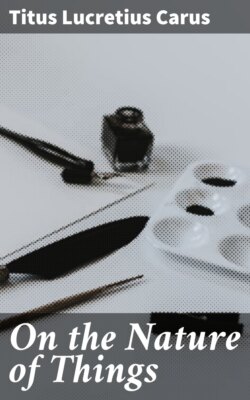Читать книгу On the Nature of Things - Тит Лукреций Кар - Страница 8
На сайте Литреса книга снята с продажи.
CHARACTER OF THE ATOMS
ОглавлениеTable of Contents
Bodies, again,
Are partly primal germs of things, and partly
Unions deriving from the primal germs.
And those which are the primal germs of things
No power can quench; for in the end they conquer
By their own solidness; though hard it be
To think that aught in things has solid frame;
For lightnings pass, no less than voice and shout,
Through hedging walls of houses, and the iron
White-dazzles in the fire, and rocks will burn
With exhalations fierce and burst asunder.
Totters the rigid gold dissolved in heat;
The ice of bronze melts conquered in the flame;
Warmth and the piercing cold through silver seep,
Since, with the cups held rightly in the hand,
We oft feel both, as from above is poured
The dew of waters between their shining sides:
So true it is no solid form is found.
But yet because true reason and nature of things
Constrain us, come, whilst in few verses now
I disentangle how there still exist
Bodies of solid, everlasting frame—
The seeds of things, the primal germs we teach,
Whence all creation around us came to be.
First since we know a twofold nature exists,
Of things, both twain and utterly unlike—
Body, and place in which an things go on—
Then each must be both for and through itself,
And all unmixed: where'er be empty space,
There body's not; and so where body bides,
There not at all exists the void inane.
Thus primal bodies are solid, without a void.
But since there's void in all begotten things,
All solid matter must be round the same;
Nor, by true reason canst thou prove aught hides
And holds a void within its body, unless
Thou grant what holds it be a solid. Know,
That which can hold a void of things within
Can be naught else than matter in union knit.
Thus matter, consisting of a solid frame,
Hath power to be eternal, though all else,
Though all creation, be dissolved away.
Again, were naught of empty and inane,
The world were then a solid; as, without
Some certain bodies to fill the places held,
The world that is were but a vacant void.
And so, infallibly, alternate-wise
Body and void are still distinguished,
Since nature knows no wholly full nor void.
There are, then, certain bodies, possessed of power
To vary forever the empty and the full;
And these can nor be sundered from without
By beats and blows, nor from within be torn
By penetration, nor be overthrown
By any assault soever through the world—
For without void, naught can be crushed, it seems,
Nor broken, nor severed by a cut in twain,
Nor can it take the damp, or seeping cold
Or piercing fire, those old destroyers three;
But the more void within a thing, the more
Entirely it totters at their sure assault.
Thus if first bodies be, as I have taught,
Solid, without a void, they must be then
Eternal; and, if matter ne'er had been
Eternal, long ere now had all things gone
Back into nothing utterly, and all
We see around from nothing had been born—
But since I taught above that naught can be
From naught created, nor the once begotten
To naught be summoned back, these primal germs
Must have an immortality of frame.
And into these must each thing be resolved,
When comes its supreme hour, that thus there be
At hand the stuff for plenishing the world.
